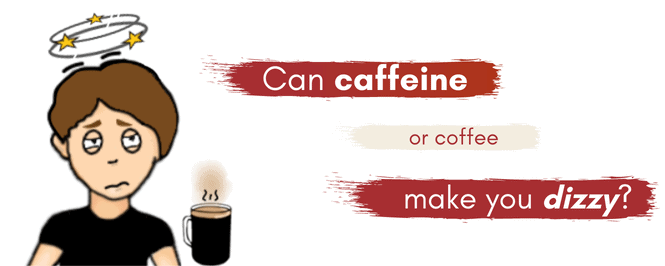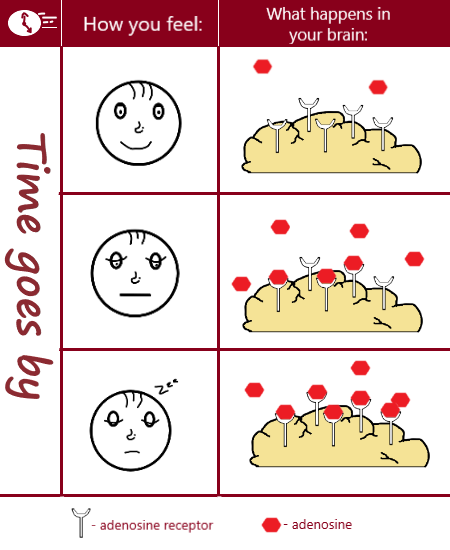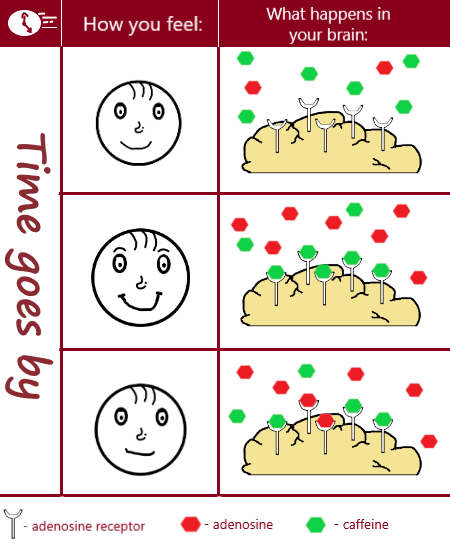Coffee’s active compound is known to boost cognitive performance and energy levels.
But can caffeine make you dizzy and could it be the reason why you’re feeling lightheaded after drinking a cup in the morning?
Experiencing unpleasant sensations, such as drowsiness or nausea, after having an espresso or a latte can be frustrating and overwhelming for some.
Especially for those who can’t imagine starting their day without a cup of Joe.
But is coffee the cause of your lightheadedness, and could it possibly make you feel tired? Maybe the sugar you’re adding is the culprit?
Can excess caffeine make you dizzy, or it’s actually the lack of this bioactive compound that causes withdrawal and consecutive fatigue?
Let’s find out!
Can caffeine cause dizziness?
Some individuals do experience discomfort after consuming caffeine, but it seems counterintuitive that it would make you feel lightheaded.
After all, it’s a compound that’s known for its energizing properties and positive effects on cognitive function.
Furthermore, coffee has been recognized as a rich source of dietary antioxidants and has been linked to many health-promoting effects.
Therefore a feeling of drowsiness and general fatigue after drinking a cup is rather unexpected, isn’t it?
Well, here’s a quick summary of whether caffeine can make you feel dizzy:
Caffeine is a central nervous system stimulant. Nevertheless, its consumption can make some individuals who are more sensitive to its effects dizzy and lightheaded.
Furthermore, drinking coffee, especially in excess, may cause unwanted side effects.
Apart from drowsiness, these include insomnia and nausea.
Moreover, too much coffee can also make you feel shaky and jittery.
I made thorough research to better understand why caffeine may lead to lightheadedness in some individuals.
So let’s explore the causes of caffeine dizziness in detail and see how you can prevent it.
Dizzy after drinking coffee: The Causes
There are many reasons why coffee may be causing drowsiness, lightheadedness, and general fatigue.
Most of these reasons are associated with its caffeine content, but not all are linked to this well-known stimulant.
So let’s go over the causes of why coffee makes you dizzy:
1. You have too much caffeine.
If not consumed in moderation, caffeine can cause negative effects such as increased anxiety and impaired sleep.
Furthermore, caffeine is known to constrict blood vessels which leads to an increased heart rate and elevation of blood pressure.
If you have too much coffee you may experience the aforementioned negative consequences.
Consequently, the sleep deprivation and high blood pressure that are triggered by caffeine, can cause lightheadedness.
Furthermore, some sources suggest that excess caffeine intake may aggravate vertigo symptoms, such as dizziness.
But what does excess caffeine intake even mean?
According to the FDA, a healthy individual shouldn’t consume more than 400 milligrams of caffeine per day. This is the amount that isn’t associated with unpleasant side effects.
For reference, a shot of espresso generally contains 65 mg to 80 mg of caffeine, while an 8 fl. oz. cup of cold brew may contain up to 200 mg of caffeine.
It’s worth noting that caffeine is also present in a wide variety of products, such as tea, chocolate, and many soft drinks.
So it’s easy to go overboard. Even more so if you’re a passionate coffee lover who has two large mugs in the morning, and a flavorful coffee treat, such as a Mocha Frappuccino, in the afternoon.
With that being said, it’s essential to point out that even 400 milligrams of caffeine per day can be too much for some individuals who are more sensitive to its effects.
Therefore, you may want to think twice before drinking your third or forth cup for the day. After all, you wouldn’t want to experience the unwanted effects or damage your sleep. In that line of thoughts, you can check out my post on how long caffeine lasts to find out when it’s best to have your last cup.
Anyway, let’s move on to the next cause of caffeine lightheadedness.
2. You’re a slow caffeine metabolizer.
Coffee may be making you dizzy because you metabolize its active compound at a slower rate.
Genetics do play a role when it comes to the way our bodies response to caffeine.
The function of the enzyme that metabolizes caffeine fluctuates depending on the person’s genes.
Furthermore, caffeine metabolism may be affected by other factors, such as your health condition, weight, whether you smoke, or take medication.
For example, there is evidence that women’s caffeine metabolism slows down during pregnancy.
This leads to an accumulation of caffeine in the body and an increased chance of experiencing its negative side effects.
That’s why the permissable daily dose of caffeine for pregnant women is 200 mg (twice less than what the dose limit for a healthy individuals is).
Therefore coffee is more likely to make you feel dizzy and lightheaded if you’re pregnant.
Contraceptives or other medicines may also inhibit caffeine metabolism.
So if you’ve started taking new medication, it may be interfering with your body’s reaction to the stimulant.
This may explain the sudden shift in your response to caffeine and why drinking coffee makes you feel dizzy, shaky, or even nauseous.
Contrarily, smoking increases the clearance of caffeine, so the stimulant doesn’t affect smokers as much.
It’s intriguing to point out that some individuals who are fast caffeine metabolizers have never even experienced its energizing properties. That’s why they’d often wonder why they still feel tired after drinking coffee.
3. You are dehydrated.
Even though caffeine has been commonly referred to as a diuretic, there is evidence that its consumption doesn’t really cause increased fluid loss in habitual coffee drinkers.
So your cup of coffee won’t make you more dehydrated than you already are.
With that being said, many individuals don’t have the habit to drink an adequate amount of water throughout the day.
One of the most common symptoms of dehydration is a feeling of dizziness and lightheadedness.
Furthermore, when you’re significantly dehydrated the amount of blood that is circulating through your body decreases.
As a consequence, your heart will start beating faster to compensate, which leads to an increased heart rate.
Caffeine is known to increase heart rate as well, more noticeable in people who are more sensitive to it.
That’s why having a shot of espresso when dehydrated is more likely to make you feel shaky and dizzy.
So if you wonder why coffee makes you lightheaded, ask yourself whether you’ve actually had enough water.
4. You drink coffee on an empty stomach.
Drinking a cup of Joe on an empty stomach is a common phenomenon.
Nevertheless, some individuals, who are more sensitive to coffee’s acidity and caffeine content, may experience discomfort after drinking coffee before breakfast.
Anyway, it’s also worth noting that having coffee with sugar on an empty stomach is more likely to cause a fast rise in blood sugar levels.
This elevation is soon followed by a sugar crash, that would make you feel drowsy and tired.
If you’ve eaten a balanced meal before or shortly after having a cup, the fiber and proteins you’ve consumed will soak up the acidity and slow down the release of caffeine in your blood.
The fiber will also slow down the sugar release, which leads to more consistent energy levels throughout the day.
5. You’ve built up caffeine tolerance.
If you’re a daily coffee drinker, in time your body will get used to its active ingredient – caffeine.
In other words, you’d build up tolerance to caffeine.
This means that you won’t experience the same energizing effects after consuming the usual amount of coffee.
Furthermore, if you’re feeling sleepy to start with, you may still feel tired and lightheaded after drinking coffee.
To make things even more clear, let’s have a look at how caffeine works.
It is a substance that acts as an antagonist of adenosine receptors.
Simply put, adenosine is an inhibitory neurotransmitter that makes us feel drowsy.
It gradually builds up when we’re awake and its levels decrease during the sleep-recovery period.
Caffeine binds to the adenosine receptors in our brains instead of adenosine and blocks them.
This way the active substance in your morning cup improves your energy levels.
Nevertheless, if you drink coffee regularly, especially in excess, your body will start to produce more adenosine receptors.
This is your body’s natural compensatory mechanism that occurs because your receptors are constantly blocked by the caffeine.
As a result, you’d still feel tired after having a cup of coffee.
Fortunately, if you quit caffeine for a week, the adenosine receptors will lower their numbers back to normal.
And you’d again start feeling the usual energy boost after having coffee.
With that being said, quitting caffeine may lead to caffeine withdrawal symptoms, such as headache, fatigue, and lower productivity.
6. You have caffeine withdrawal
Caffeine withdrawal may be the reason why you feel dizzy and lightheaded even after you’ve had a cup of coffee.
Despite drinking the same number of cups per day, withdrawal symptoms may occur if you’ve switched the type of coffee beans or the brewing method you’re using.
For example, Robusta beans have twice the amount of caffeine compared to Arabica.
So if your usual blend contains more Robusta, and you switch to a 100% Arabica blend, you may notice a difference in the way your coffee affects you.
Moreover, the drastic change in the amount of caffeine one consumes may sometimes happen unintentionally.
For example, a friend of mine bought a bag of decaf instead of regular coffee by accident.
She and her boyfriend had it for a whole week before realizing that they were actually using decaffeinated coffee beans.
Throughout this time they were wondering why they felt sleepy even after having their cup.
Furthermore, since caffeine withdrawal may trigger migraine attacks they had really bad headaches. Migraine is often accompanied by unpleasant lightheadedness, so they felt dizzy troughout those days.
What I’m trying to say is: check the label on the bag of beans you’re using. There you may find the answer to why you feel drowsy after drinking coffee.
Final Words
Having coffee or consuming caffeine in some form doesn’t cause dizziness in most people.
Nevertheless, given certain circumstances, it sure can make some feel lightheaded.
I hope that you found this article helpful! Leave me a comment below if you have any questions or share your experience to help out others!



